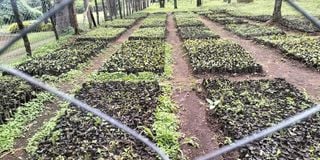How Menengai residents are reviving Nakuru’s forest through community action

One of the tree nurseries managed by Menengai Community Forest Association.
In the heart of Nakuru County, the Menengai Community Forest Association (CFA) is a shining example of how local communities can spearhead meaningful environmental conservation efforts.
For over a decade, the association has been at the centre of efforts to protect and restore the Menengai Forest ecosystem, demonstrating that when communities take ownership, conservation becomes transformative as well as sustainable.
Bishop Titus Mugi, the association's chairman, reflects on its journey and the progress made since its inception.
"The association was formed following the passing of an Act of Parliament that enabled communities to collaborate with the Kenya Forest Service (KFS) in the management and protection of forests. The Act provided an opportunity for communities to play a role in safeguarding these vital natural resources," he explains.
The Menengai CFA unites members from five constituencies, Bahati, Subukia, Rongai, Nakuru East and Nakuru West and encompasses a vast 6,018 hectares of forest.
What began as a small initiative has evolved into a well-organised network balancing conservation with livelihood support.
The association runs three community tree nurseries which supply seedlings for reforestation efforts. Members have also embraced alternative income-generating activities, including beekeeping and agroforestry, thereby reducing their dependence on forest resources.
"Our members have taken up beekeeping not just as a source of income, but also as a way to protect trees. No one cuts down trees where bees are kept and the bees, in turn, aid pollination, enhancing the entire ecosystem," says Bishop Mugi.
Beyond reforestation, the CFA actively promotes clean energy solutions. Through awareness campaigns, families are encouraged to use liquefied petroleum gas (LPG) and energy-saving stoves, thereby reducing the demand for firewood.
“We have carried out extensive awareness-raising activities to encourage households to adopt cleaner, more sustainable cooking methods,” adds Bishop Mugi.
Despite its successes, the Menengai CFA continues to face several challenges. Chief among these are water scarcity and frequent forest fires, both of which endanger tree nurseries and reforestation initiatives.
"A lack of water makes it difficult to maintain the nurseries or fight fires effectively. However, we are working closely with the Kenya Forest Service and other partners to address these issues. An electric fence is also being erected to curb encroachment and illegal grazing," says Bishop Mugi.
The CFA currently operates nine user groups involved in various conservation activities, including tree planting, firewood collection, grazing management, and water conservation.
To empower its members further, the association has partnered with training institutions to provide capacity-building training in poultry keeping, goat rearing, rabbit farming and organic agriculture.
"These training programmes have transformed the community’s mindset. People now see conservation as a shared responsibility and as a potential source of income," he explains.
Looking ahead, the association hopes to establish Menengai Forest as a leading ecotourism destination in Kenya.
Given that the Menengai Crater is the second largest in Africa, the CFA plans to develop nature trails, picnic sites, cultural centres and zip-lining facilities to attract visitors and generate revenue for conservation.
"We want to make Menengai a place where people can enjoy nature while supporting its protection," says Bishop Mugi.
The CFA's success is also reflected in the growing involvement of women and young people.
Margaret Wanjiku, a member of the Menengai Forest Apiculture Group, says that beekeeping has changed her life.
“We started with five beehives last year, and now we have about thirty. Bees provide security because nobody cuts down trees where they are kept. They also support pollination and help the forest to thrive," she says proudly.
Having joined the group to gain financial independence, Wanjiku now urges young people to take part in environmental initiatives.
“Let’s conserve the environment and engage in productive activities. Doing something with your own hands helps the planet and shapes your future." she says.
As Nakuru marked Mazingira Day, Bishop Mugi urged residents to take personal responsibility for protecting the environment.
“Each one of us should plant at least one tree, either a fruit tree or an indigenous species,” he emphasised.
The work of the Menengai Community Forest Association makes it clear that sustainable conservation begins with the community. As Menengai’s story shows, when people and nature thrive together, the results can be truly transformative.


